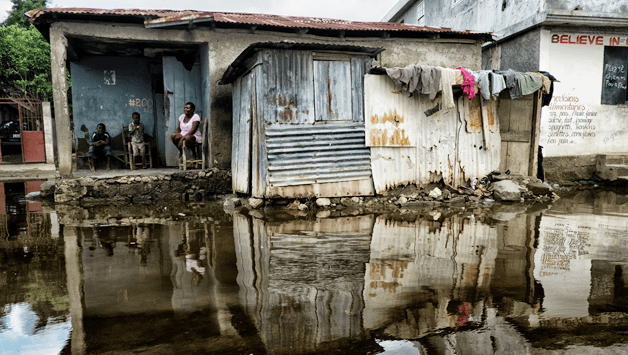Mabadiliko ya tabianchi ni mabadiliko ya muda mrefu kuanzia miongo mpaka milenia ya muundo wa hali ya hewa ikijumuisha jotoridi, kunyesha kwa mvua, upepo, mgandamizo wa hewa na mielekeo mingine ya tabianchi katika dunia. Kwa zaidi ya 95% mabadiliko ya tabianchi husababishwa na shughuli za binadamu ambazo hupelekea uzalishaji na ongezeko la gesi joto kwenye angahewa na hatimaye kupelekea ongezeko kubwa la joto kama tunaloshuhudia sasa hivi, ukame, majanga ya mafuriko, vimbuka, kubadilika kwa mgawanyo na muda wa mvua kunyesha, kuzuka na kuenenea kwa magonjwa mbalimbali, kuzama kwa visiwa, kuongezeka kwa maji chumvi, kuhama hama na migogoro ya rasilimali kama ilivyo kati ya wakulima na wafugaji.
Matatizo ya kiafya ambayo yanachangiwa mabadiliko ya tabianchi katika kuenea na kutokea kwake ni malaria, homa ya bonde la ufa, denge, kipindupindu, magonjwa ya moyo na mfumo wa upumuaji, kiharusi, saratani, utapiamlo, zika, msongo wa mawazo, udumavu wa watoto, magonjwa ya mfumo wa fahamu. Haya ni baadhi tu ya matatizo ya kiafya ambayo mabadiliko ya tabianchi yana mchango katika kutokea na kuenea kwa kasi zaidi.
 |
Nyanya zikiwa zimekauka shambani huko kishapu Shinyanga.
Picha na Tajiel Urioh, September 2015 |
Ili uwe na Afya nzuri unahitaji maji safi na salama, hewa safi, chakula bora na makazi salama, lakini vitu hivi vyote vinaathiriwa na mabadiliko ya tabianchi. Kutokana na ukame hali ya uzalishaji wa chakula bora na cha kutosha inazorota kwa kasi, shughuli mbalimbali za uzalishaji viwandani na majumbani zinachangia sana uchafuzi wa hewa na kupelekea matatizo ya kiafya. Upatikanaji wa maji safi na salama unazidi kuwa changamoto kubwa sana kutokana na ongezeko kubwa la joto duniani linalosababishwa na mabadiliko ya tabianchi, ebu fikiri maisha pasipo maji!, maji ni uhai. Leo hii watu wanahama makazi yao kwa kutopenda kutokana na athari za mabadiliko ya tabianchi katika maeneo yao, kwa mfano majanga ya ukame, kuongezeka kwa magongwa, vimbunga, mafuriko, migogoro ya rasilimali na mengiyo, mwisho wa siku haya yote yanathiri ustawi wa afya yako na jamii.















